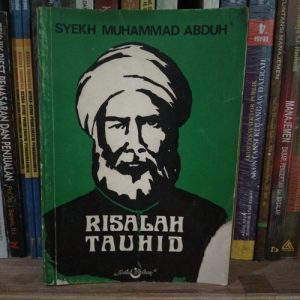Ahmad Farouk Musa & Piet Hizbullah Khaidir || 5 March 2024
Islamic Rationality and the Rational Thought of Harun Nasution
 Nasution believed that the dominance of fatalism, especially in Ash’arite theology—the predominant position of the Malay Muslims of the Nusantara—hampered Islamic rationality to such an extent that Muslims are unfazed by change, engage awkwardly with modernity, and lack the ability to develop science and technology. Historically, during the Abbasid period, the Islamic civilisation could progress thanks to the rapid development of science in various fields. This was enabled theologically by the acceptance of the primacy of reason. The state theology at that time was the Mu’tazilite, a school of kalām that favoured reason in understanding Islam. As a result, Islam became a beacon of world civilisation for advancing in science and technology (Watt, 1985, pp. 33-55). This explains Nasution’s emphasis on the importance of embracing a theology that favours rationality. His dissertation upholds the urgency for Muslims to adopt rationality in their lives in order to achieve progress (Nasution, 1987).
Nasution believed that the dominance of fatalism, especially in Ash’arite theology—the predominant position of the Malay Muslims of the Nusantara—hampered Islamic rationality to such an extent that Muslims are unfazed by change, engage awkwardly with modernity, and lack the ability to develop science and technology. Historically, during the Abbasid period, the Islamic civilisation could progress thanks to the rapid development of science in various fields. This was enabled theologically by the acceptance of the primacy of reason. The state theology at that time was the Mu’tazilite, a school of kalām that favoured reason in understanding Islam. As a result, Islam became a beacon of world civilisation for advancing in science and technology (Watt, 1985, pp. 33-55). This explains Nasution’s emphasis on the importance of embracing a theology that favours rationality. His dissertation upholds the urgency for Muslims to adopt rationality in their lives in order to achieve progress (Nasution, 1987).
Nasution contends that Abduh’s theology went beyond the theology of the Mu’tazilites with its focus on human autonomy and the use of reason. Abduh, according to him, transcended the Mu’tazilites by discussing the ability of reason in making social laws that can be obeyed by the public. Therefore, for him—like Muhammad Abduh—the rational theology as developed by Mu’tazilites serves not merely as an intellectual exercise and academic discourse, but as a theological basis for Islamic reform and modernism (Mujani, 1994, p. 101).
This confirms Nasution’s position as a reformer with a rational ethos, a commitment to scientific pursuit, and the courage to question what is traditionally established in religion. He firmly believed that the advancement of Islam is premised on its belief in science and religion as a tool for the modernisation of the Muslim community in Indonesia. It is therefore no wonder that when offered the mandate to become the head of Institut Agama Islam Negeri (IAIN, State Institute for Islamic Studies), he accepted it and earnestly embarked on a process of curriculum change together with institutional and thought reforms. His goal was to turn IAIN into a model Islamic educational institution—the beacon of modern Islamic thought and progress that could be felt reverberating within the archipelago (Ali, 2019, pp. 6-7).
In this regard, Nasution’s rational thought is distinctive in at least three aspects, namely: (1) his emphasis on rational theology of the Mu’tazilites and Muhammad Abduh, borrowing the latter’s views on absolute and relative terminology, (2) his efforts to develop a broader understanding of Islam including but not limited to the Qur’an and Hadith, and (3) his understanding of the inextricable relationship between reason and revelation.
Nasution contends that the rational theology of the Mu’tazilites brought progress. When the Ash’arites marginalised the Mu’tazilites, Muslims were in decline due to the neglect of science and technology. He believed that Islam is a rational religion created by Allah without any contradiction. As with his emphasis on the rational Mu’tazilite theology, his views on rational Islam were heavily influenced by Abduh (Ali, 2019, pp. 6-7).
After an in-depth study of Abduh’s work in Risālat al- Tawḥīd, Nasution concluded that Abduh’s theology is in fact more radical than the Mu’tazilites. In Risālat al- Tawḥīd (1898), ‘Abduh notes in its opening words that tawhid refers to “the belief that God is One and has no associates (lā sharīka lahu)”. This is the fundamental pillar of Islam, the one that every Muslim acknowledges through the shahādah, the profession of faith: la ilāha illa Allah, “there is no god but God.” In fact, since God’s oneness and self-sufficiency does not allow for intermediation between the Divine and the human, tawḥīd becomes the basis for invoking an egalitarian political ethos: everyone is equal before God, and subject only to His will as expressed in His revealed law—any social hierarchy based on class, race, or nationality is illegitimate.
It was an idea that could bring about a backlash from the relatively conservative Indonesian religious landscape. Nasution therefore thought it was wise to delay publishing a translation of his dissertation in Indonesian language until he had a more receptive audience (Mujani, 1994, p. 100). In fact, Nasution does not regard rationalism and sufism as mutually exclusive. He defines sufism as the moral qualities emanating from a rational understanding of revelation, a claim that he defends in his books Reason and Revelation in Islam (Nasution, 1982) and Philosophy and Mysticism in Islam (Nasution, 1973).
Nasution’s rational philosophy was influenced by Abduh, especially with regard to the muhkamāt (absolute) and the mutaghayyirāt (relative or changing). Abduh neatly divided the teachings of the Qur’an and hadith into two areas: firstly, areas of worship which are unambiguous and immutable (muhkamāt); and secondly, areas of social relations that are sometimes ambiguous and mentioned in general terminology whose specific understanding, interpretation and application can be adapted to the time and place (mutaghayyirāt).
The absolute (muhkamāt) contains monotheism and other fundamental teachings, while the relative (mutaghayyirāt) is understood through historical interpretation and application related to economic, political and governmental issues. Thus, the caliphate system of government is considered relative while leadership based on justice is absolute. A good example of this principle is Caliph Umar’s decision to stop giving money to converts because he saw no more reason to do so when Muslims had already achieved a reasonable level of prosperity (Ali, 2019). Umar’s rational decision is drawn from his understanding of the Qur’an and ḥadīth which affirms the use of reason.[1]
As a riposte to his critics who claim that his rational thinking was influenced by Orientalism, Nasution retorts that they understand neither him nor his thinking (Mujani, 1994, p. 115). He affirmed that his rational theology is influenced by Muhammad Abduh and the Mu’tazilites. Moreover, he reminded his critics that since Islam itself mandates intellectual curiosity, Muslims have a rich legacy of rational thinking—which is not the prerogative of the West—from classical Islamic scholars.
For Nasution, the overarching role of rationality in Islam is not restricted to fiqh (jurisprudence), worship, tafsīr(hermeneutics) and ḥadīth (transmitted reports attributed to what the Prophet said and did). Rather, it extends to history, civilisation and culture, economics and politics. Therefore, rationality is needed to transform these aspects of Islamic teachings into the theoretical and practical realms. Especially with regard to fiqh, he warns that an overreliance on fiqhwill trap Muslims into futile debates that revolve around traditionalist and textual ways of thinking.
Nasution’s views regarding the text of the Qur’an and hadith are similar to Muhammad Imārah (1931-2020), an Egyptian Islamic thinker. They both believe that insofar as it is properly interpreted through the faculty of reason, the text is never contradictory or incoherent with respect to the Islamic ethos. Hence, contrary to the Orientalist argument, there is no need to cherry-pick and only accept verses that satisfy our whims and fancies. If there is seemingly any discrepancy between the text and maṣlaḥah or common good, then maṣlaḥah must be prioritised (Imarah, 2020, pp. vii-x).
 However, in the West, Harun Nasution is more often likened to Abdulkarim Soroush, a radical Iranian thinker who calls for an Islamic reformed theology. Soroush meticulously examined the historical and human nature of religion, religious experience, revelation, the role and place of the Prophet in the prophetic mission, the position of scripture and how these are all interrelated. He then concludes that a viable and meaningful Islamic reform in modern times cannot simply mean posing new questions to an outdated frame of references and working out their solutions by using outdated concepts. Hence, Soroush stresses the need to create new concepts and frames of reference of which rationality is the most important component (Soroush, 2000, pp. xi-xix) (Sadic, 2022).
However, in the West, Harun Nasution is more often likened to Abdulkarim Soroush, a radical Iranian thinker who calls for an Islamic reformed theology. Soroush meticulously examined the historical and human nature of religion, religious experience, revelation, the role and place of the Prophet in the prophetic mission, the position of scripture and how these are all interrelated. He then concludes that a viable and meaningful Islamic reform in modern times cannot simply mean posing new questions to an outdated frame of references and working out their solutions by using outdated concepts. Hence, Soroush stresses the need to create new concepts and frames of reference of which rationality is the most important component (Soroush, 2000, pp. xi-xix) (Sadic, 2022).
According to Nasution, only the Qur’an and hadith in the category of mutawātir (sound hadith with successive narration) can be used as the basis for Islamic creed. While some discern a certain Orientalist influence in this radical view, the Indonesian thinker is simply cautioning against the use of controversial hadith when issuing religious edicts. In fact, the history of hadith codification itself shows that hadith was not written in the early days of the sahābah(companions of the Prophet) because it was feared that it might get mixed with the Qur’an (Jamal, 2020).
Nasution clarifies his stand on rationalism in the concluding chapter of his book Akal dan Wahyu (Reason and Revelation):
In this regard, it is necessary to emphasize that the use of the words rational, rationalism and rationality in Islam must be detached from the true meaning of the word, that is, to merely using reason and to disregard revelation, or to make reason higher than revelation, so that revelation can be nullified by reason. In Islamic thought, some have been seen in the description given above, both in the field of philosophy and the science of kalam, what more in the field of fiqh, reason never cancels revelation. The intellect remains subject to the text of revelation. The text of revelation is still considered absolutely true. The intellect is used only to understand the text of revelation and not to oppose revelation. The intellect only gives interpretation to the text of revelation according to the tendency and ability of the interpreter (Nasution, 1982, p. 101).
The above excerpt confirms that Nasution does not subscribe to an unbridled rationalism. Being itself created by God, rationalism cannot be above kalam Allah or revelation. Thus, contrary to the Western enlightenment project, Nasution’s aim is to modernise Islam through rationalism without secularism, that is, through a rational interpretation of revelation.
[1]Based on the story told by Faris Pari to the second author (interview, February 25, 2020) in the Postgraduate classroom of UIN Jakarta (S2 and S3).
Bibliography
Abdullah, M. A. (1996). Studi Agama: Normativitas atau Historisitas? Yogyakarta: Pustaka Pelajar.
Ali, M. (2019). Harun Nasution. Retrieved February 7, 2020, from Oxford Islamic Studies Online
Braun, J. (2017). A Critique of Max Horkheimer’s Critique of Instrumental Reason. The American Sociologist, 48(2), 192–207.
Haleem, M. A. (2017). Exploring the Qur’an: Context and Impact. London: I. B. Tauris.
Hamka. (1982). Tafsir Al-Azhar Vol. 1. Jakarta: Pustaka Panjimas.
Hasbiansyah, O. (2008). Pendekatan Fenomenologi: Pengantar Praktik Penelitian dalam Ilmu Sosial dan Komunikasi. Mediator: Jurnal Komunikasi, 9(1), 163-180.
Husserl, E. (1965). Phenomenology and the Crisis of Philosophy: Philosophy as Rigorous Science. New York: Harper & Row.
Imarah, M. (1988). Mu’tazilah wa Mushkilah al-Hurriyah al-Insaniyah. Cairo: Dar al-Syuruq.
Imarah, M. (2020). Mu’tazlah dan Persoalan Kebebasan Insan. Kuala Lumpur: Islamic Renaissance Front.
Ishak, M. S. (2009). Islamic Rationalism: A Critical Evaluation of Harun Nasution’s Thought. Gombak: IIUM Press.
Jamal, K. (2020). Hadits dalam Pandangan Harun Nasution. Retrieved February 7, 2020
Lyons, J. (1985). Phenomenology. In Encyclipaedia Britannica. Chicago: University of Chicago Press.
Madjid, N. (1989). Abduhisme Pak Harun. In Panitia Penerbitan Buku dan Seminar, Refleksi Pembaharuan Pemikiran Islam: 70 Tahun Harun Nasution (pp. 102–110). Jakarta: Lembaga Studi Agama dan Filsafat.
Mujani, S. (1994). Mu’tazilah Theology and the Modernization of the Indonesian Muslim Community: Intellectual Portrait of Harun Nasution. Studia Islamika, 1(1).
Nasution, H. (1969). The Place of Reason in ‘Abduh’s Theology: Its Impact on his Theological System and Views. Montreal: McGill University.
Nasution, H. (1972). Teologi Islam: Aliran-aliran, Sejarah, Analisa Perbandingan. Jakarta: UI Press.
Nasution, H. (1973). Falsafah dan Mistisisme dalam Islam. Jakarta: Bulan Bintang.
Nasution, H. (1982). Akal dan Wahyu dalam Islam. Jakarta: Penerbit Universitas Indonesia.
Nasution, H. (1985). Perkembangan Modern dalam Islam. Jakarta: Yayasan Obor.
Nasution, H. (1987). Muhammad Abduh dan Teologi Rasional Muktazilah. Jakarta: UI Press.
Nasution, H. (1995). Islam Rasional: Gagasan Dan Pemikiran. Bandung: Penerbit Mizan.
Peta, I. (2022). Aḥmad Amīn’s Rationalist Approach to the Qur’ān and Sunnah. Religions, 13(3: 234), 1-15. doi
Riddell, P. G. (2001). Islam and the Malay-Indonesian World: Transmission and Responses . Hawaii: University of Hawaii Press.
Sadic, R. (2022). Abdolkarim Soroush’s Pluralistic Philosophy of Religion. Synthesis Philosophica, 73(1), 223-235.
Salleh, F. (2001). Modern Trends in Islamic Theological Discourse in the 20th Century Indonesia: A Critical Survey. Leiden: Brill.
Saude. (2011). Pemikiran Harun Nasution Tentang Mistisisme Dalam Islam (Disertasi). Makassar : UIN Alauddin Makassar.
Soroush, A. K. (2000). Reason, Freedom, & Democracy in Islam: Essential Writings of ‘Abdolkarim Soroush. Oxford: Oxford University Press.
Syakur, A. (2018). Polemik Harun Nasution dan HM Rasyidi Dalam Mistisisme Islam. Ulul Albab, 19(2).
Thahir, L. S. (2003). Harun Nasution (1919-1998) Interpretasi Nalar Teologi dalam Islam. Yogyakarta: Program Pascasarjana IAIN Sunan Kalijaga.
Watt, W. M. (1985). Islamic Philosophy and Theology. Edinburgh: Edinburgh University Press.
 Dato’ Dr Ahmad Farouk Musa is an academician & researcher at Jeffrey Cheah School of Medicine & Health Sciences, Monash University Malaysia. He is also the Founder & Director of Islamic Renaissance Front, Kuala Lumpur. ORCID ID: 0000-0002-2303-7813.
Dato’ Dr Ahmad Farouk Musa is an academician & researcher at Jeffrey Cheah School of Medicine & Health Sciences, Monash University Malaysia. He is also the Founder & Director of Islamic Renaissance Front, Kuala Lumpur. ORCID ID: 0000-0002-2303-7813.
 Dr Piet Hizbullah Khaidir is a Director, Sekolah Tinggi Ilmu al-Qur’an & Sains Al-Ishlah (STIQSI), Lamongan, Jawa Timur. ORCID ID: 0009-0002-5517-8132.
Dr Piet Hizbullah Khaidir is a Director, Sekolah Tinggi Ilmu al-Qur’an & Sains Al-Ishlah (STIQSI), Lamongan, Jawa Timur. ORCID ID: 0009-0002-5517-8132.
This manuscript was first published in a SCOPUS-Indexed journal Intellectual Discourse at https://doi.org/10.31436/id.v31i2.2054

